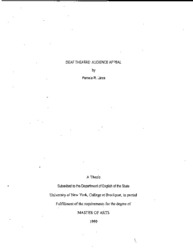Deaf theater: audience appeal
Abstract
A majority of Deaf Americans agree that viewing a typical theatrical performance is a formidable task. In the second half of this century, attitudinal changes made by Americans have resulted in new and increased opportunities for their Deaf counterparts to participate in American theatre. American theatregoers who are Deaf can choose plays in general theatre as well as those in Deaf theatre. However, they experience problems in appreciating plays in Deaf theatre. More specifically, audience appeal is the main problem. Audience appeal refers to a concept in which major aspects of performances are designed to engage the thoughts and reactions of a group of spectators. Its definition is slightly expanded for playgoers who are Deaf; the aspects of performances are generally designed to that they play on human visual capacities. Essential characteristics of audience appeal for Deaf audiences consist of adding sign language principles and conventions from Deaf culture. Scholarly research in the recent years has shown that the Deaf audience members have preferences as to how they enjoy a theatrical experience. Some experts argue that the visual aspect of the performance is the most important consideration, while others contend that choice of language and culture contributes most significantly to appeal for Deaf audiences. Some argue that accessibility, not audience appeal, is the main problem. This may be misleading. Accessibility can simply refer to the way of getting in the theatre and provision of services. But it does not optimize Deaf audiences' theatrical experiences. In the light of textual, historical, and cultural research, the problem of audience appeal for Deaf people is investigated. To address the persistent problem of audience appeal, some experts recommend careful attention to cross-cultural issues. Other experts endorse innovative strategies that meet the needs of both Deaf and hearing audiences. Some contend that the above proposals will not help resolve the problem. They claim that development of productions unique to Deaf people is the only feasible solution. However, according to other experts, this solution is impractical in terms of cost and attendance. This thesis informs that audience appeal for the Deaf in theatre is problematic, evaluates the existing strategies that have been implemented, and offers a set of suggestions for an improved Deaf theatre for its audiences. This thesis includes information and recommendations for playwrights, directors, casts, audiences, and critics who are advocates of audience appeal for theatregoers who are Deaf.
Collections
The following license files are associated with this item:
Related items
Showing items related by title, author, creator and subject.
-
Actor Bernard Bragg creates theater endowment at NTID
NTID (Rochester Institute of Technology, 2006-05-12)Internationally acclaimed deaf actor, playwright, and director Bernard Bragg has committed $100,000 to the National Technical Institute for the Deaf, a college of Rochester Institute of Technology, to establish the Bernard ... -
NTID gets OK to offer a certificate in theater
Unknown author (Rochester Institute of Technology, 2001-03-14)The National Technical Institute for the Deaf(NTID) at Rochester Institute of Technology (RIT) received approval by the New York State Department of Education to establish a certificate program for the Center of Performing ... -
The Caldwell theater complex
McKee, Cameron Taylor (1995-11-21)

